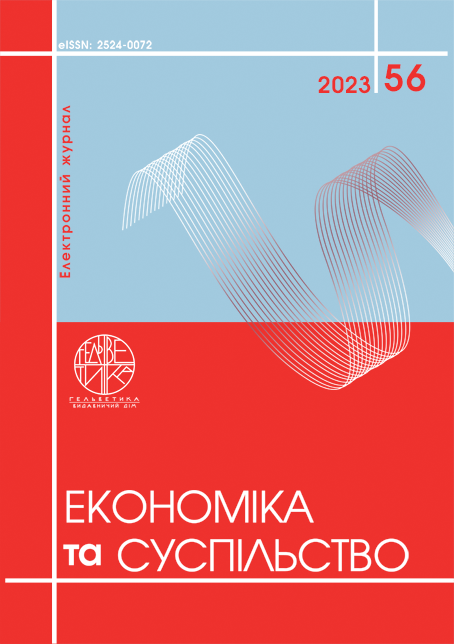VARIABILITY OF CORPORATE SCIENTIFIC AND TECHNOLOGICAL TRANSFER STRATEGIES IN THE CONDITIONS OF DIGITALIZATION OF INTERNATIONAL BUSINESS
Abstract
The article is devoted to topical issues regarding the rights of ownership of powerful production, investment, technological, innovative, financial, human, managerial and institutional resources that are unattainable for other economic entities. In recent decades, BNPs have gained the reputation of the most innovative entities of global business. Formation in the first quarter of the XXI century. of the global model of the technological division of labor and the activation of the fundamental processes of technoglobalism are powerful drivers of increasing the scale and diversification of international scientific, technical and innovative cooperation. Despite the establishment of fairly extensive knowledge sharing channels in the global innovation system and the emergence of a large number of dynamically growing new companies in the non-monopoly sector of the economy in the global technological field, multinational enterprises are the main institutional platform for cross-border technology transfer. Their innovative activity, along with colossal value volumes and diversified sectoral structure of DiR, is currently characterized by sharp inter-firm competitive rivalry. This encourages companies not only to constantly modernize corporate strategies and business models, but also to build corporate ecosystems of open innovation with maximum adaptation of their own innovative developments to the needs of the local markets of base states and host countries, stimulation of global demand for their products, and involvement of the most trained and highly qualified workers and scientific and technical personnel. They acquire their concentrated expression in the powerful transformational influence of BNP on the structural dynamics of the processes of technoglobalism in the way of increasing the value scale and diversification of corporate D&R, "embedding" corporate business structures in global value chains, as well as building them ecosystems of open innovations, scientific and technical platforms and global knowledge networks. The latter not only generate powerful impulses for multinational companies to overcome narrow national frameworks of innovative activity, but also form a strong "stable backbone" of cross-border scientific and technological exchange as a specific sphere of international economic relations and an overriding mechanism for the introduction of the most progressive achievements of world scientific thought into global reproductive processes.
References
Антонюк Л. Міжнародна конкурентна диспозиція національних систем вищої освіти / Л. Антонюк, Д. Ільницький, Д. Барабась, М. Сандул // Міжнародна економічна політика. 2017. № 2. С.7-39. URL: http://nbuv.gov.ua/UJRN/Mep_2017_2_3
Данилова К. (2017). Спадщина Д. Рікардо у ХХІ столітті: теорія порівняльних переваг крізь призму історико-інституціонального аналізу. Історія народного господарства та економічної думки України. вип.50. С.172-208.
Ільницький Д.О. Глобальна конкуренція в науково-освітньому просторі: [монографія] / Д.О.Ільницький. — К.: КНЕУ, 2016. — 445 с.
Стратегії конкурентного розвитку у глобальній економіці: монографія / [А. М. Поручник, Я. М. Столярчук, А. М. Колот та ін.]; за заг. ред. А. М. Поручника та Я. М. Столярчук. К.: КНЕУ, 2016.
Antonelli C., Fassio C. The economics of the light economy: Globalization, skill biased technological change and slow growth. Technological Forecasting and Social Change. 2014. Volume 87. P. 89-107.
Balassa, B., Noland M. (1989). "Revealed Comparative Advantage in Japan and the United States". Journal of International Economic Integration. 4 (2): 8–22. doi:10.11130/jei.1989.4.2.8
Coe D.T., Helpman E., 1995. International R&D spillovers // European Economic Review. vol 39, pp.859-887.
Nelson, R. R. (2008). Economic development from the perspective of evolutionary economic theory. Oxford development studies, 36(1), 9-21.
Rebentisch E. S., Ferretti M. A Knowledge-Based View of Technology Transfer in International Joint Ventures. Journal of Engineering Technology Management. 1995. Vol. 12. P. 1-25.
Antoniuk L. Mizhnarodna konkurentna dyspozytsiia natsionalnykh system vyshchoi osvity / L. Antoniuk, D. Ilnytskyi, D. Barabas, M. Sandul //[ International competitive disposition of national systems of higher education]. Mizhnarodna ekonomichna polityka. 2017. № 2. S. 7-39. URL: http://nbuv.gov.ua/UJRN/Mep_2017_2_3 [in Ukraine].
Danylova K. (2017). Spadshchyna D. Rikardo u KhKhI stolitti: teoriia porivnialnykh perevah kriz pryzmu istoryko-instytutsionalnoho analizu. Istoriia narodnoho hospodarstva ta ekonomichnoi dumky Ukrainy. [ The legacy of D. Ricardo in the 21st century: the theory of comparative advantages through the prism of historical-institutional analysis. History of national economy and economic thought of Ukraine]. Vyp.50. S.172-208. [in Ukraine].
Ilnytskyi D.O. Hlobalna konkurentsiia v naukovo-osvitnomu prostori: [monohrafiia] [Global competition in the scientific and educational space: [monograph]]. / D.O.Ilnytskyi. — K.: KNEU, 2016. — 445 s. [in Ukraine].
Stratehii konkurentnoho rozvytku u hlobalnii ekonomitsi: monohrafiia [Competitive development strategies in the global economy: monograph ]./ [A. M. Poruchnyk, Ya. M. Stoliarchuk, A. M. Kolot ta in.]; za zah. red. A. M. Poruchnyka ta Ya. M. Stoliarchuk. K.: KNEU, 2016. [in Ukraine].
Antonelli C., Fassio C. The economics of the light economy: Globalization, skill biased technological change and slow growth. Technological Forecasting and Social Change. 2014. Volume 87. P. 89-107. [in English].
Balassa, B., Noland M. (1989). "Revealed Comparative Advantage in Japan and the United States". Journal of International Economic Integration. 4 (2): 8–22. doi:10.11130/jei.1989.4.2.8 [in English].
Coe D.T., Helpman E., 1995. International R&D spillovers // European Economic Review. vol 39, pp.859-887[in English].
Nelson, R. R. (2008). Economic development from the perspective of evolutionary economic theory. Oxford development studies, 36(1), 9-21.
[in English].
Rebentisch E. S., Ferretti M. A Knowledge-Based View of Technology Transfer in International Joint Ventures. Journal of Engineering Technology Management. 1995. Vol. 12. P. 1-25. [in English].

This work is licensed under a Creative Commons Attribution 4.0 International License.


